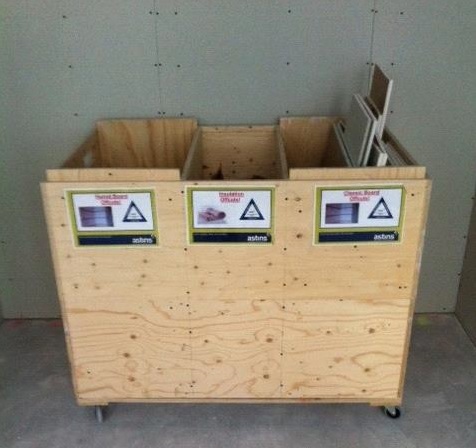The construction industry has rapidly developed in recent years, but arguably is still lagging behind other industries. With the recent publications of the government’s Construction 2025 targets, the industry is under the spotlight to collaborate to meet the government’s expectations. With Plasterboard as one of the most widely used materials in the industry, Astins has, over the last 5 years, embarked on a continuous improvement journey to reduce plasterboard waste. During this time, Astins have reduced this waste by 40% and we have published a report to share our knowledge and findings with the wider industry.
Initially, Astins focused upon site base processes to reduce waste, in particular, the reuse of off-cuts. However, as we concentrated on waste generation, it became apparent that issues from the supply chain, as well as the external client, also have a significant impact on the production of plasterboard waste.
The Lean Construction Institute “Eight Waste” model was used to facilitate discussion of the cause of plasterboard waste and thus to advise the practical steps Astins should take to reduce this. Findings included; transport, inventory, motion, waiting, over processing, over production, defect and skill. A significant effect of this model is that it helped to raise the visibility of the influencing factor, in this case, the impact of external suppliers, highlighting an opportunity to engage the supply chain to support the overall reduction in waste.
Our findings from the “Eight Waste” model are summarised as below:
- Transport: High quality packaging would potentially protect the boards from being damaged by heavy machinery and advanced transfer tools can reduce the damage of the boards during transfer.
- Inventory: Creating ownership and improving the flexibility of ‘Green Rooms’ increases the effectiveness for the use of off-cuts, reducing the plasterboard waste.
- Motion: Narrower and lighter boards appear to give packs greater rigidity, resulting in less material breakage. In addition, smaller boards were found to have a positive benefit for the Operatives’ health and safety.
- Waiting: Sufficient storage space and trestles to store boards at 600mm were found to allow ‘improved’ storage showing significant benefits in reducing waste and improving H&S.
- Over production: Design has a significant impact upon waste and is clearly an area where significant benefits are possible; early engagement with the main contractor will facilitate this.
- Over processing: Manufacturers should be further engaged to minimise waste arising on site.
- Defect: The higher value of the average unit length per defect indicates a lower frequency of defects hence less plasterboard waste is generated. A good quality control management system was found to be effective in reducing and indeed preventing the defects that lead to plasterboard waste.
- Skill: Improving skills and understanding at all levels of the business contributed to lessening the waste overall.
Interestingly, this study has also prompted safety improvements by highlighting the benefits of 900mm plasterboard over 1200mm. This has been taken forward as a further topic for research.
Despite the success so far, there is still inconsistency between sites as the design has significant impact (both positive and negative) upon waste. However, consideration at the ‘input’ stage (design) has significantly more influence than at the ‘output’ stage (re-use of off-cuts).
Further significant reductions in plasterboard waste will come from a greater collaboration with the Astins supply chain.
If you are interested for more details please refer to the full report.
Astins Plasterboard Waste – Sustainable Improvement Study
Jun Yue is a Business Analyst & System Manager at Astins Ltd who are national members of Constructing Excellence


Comments are closed.